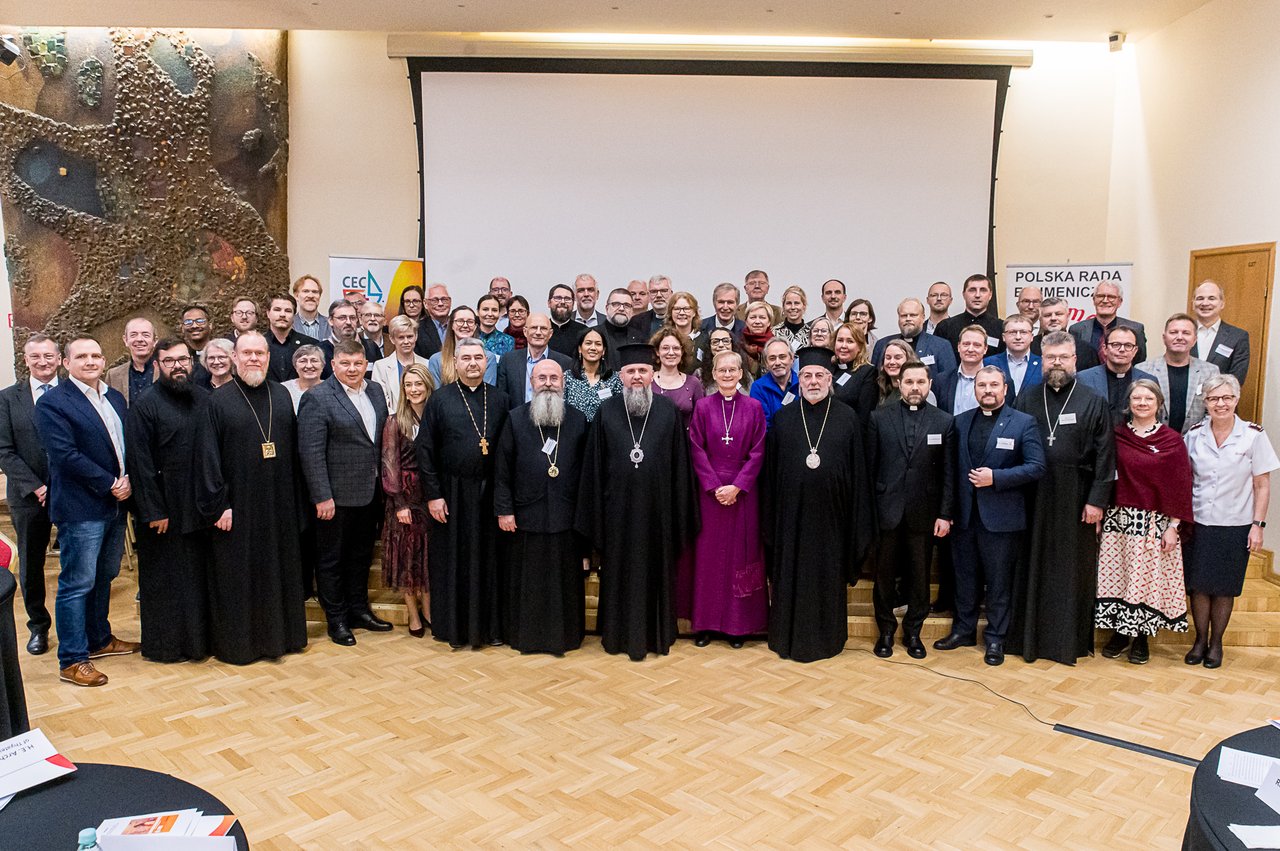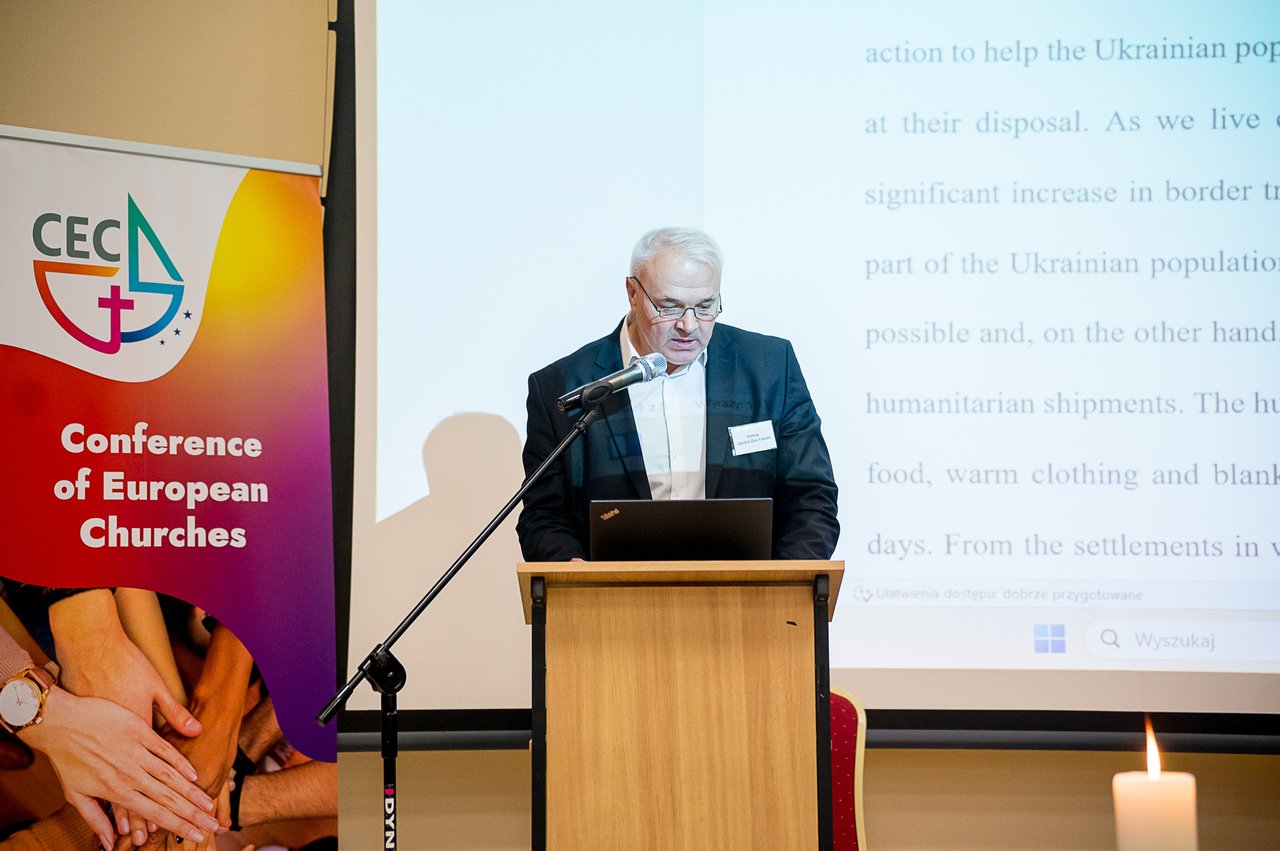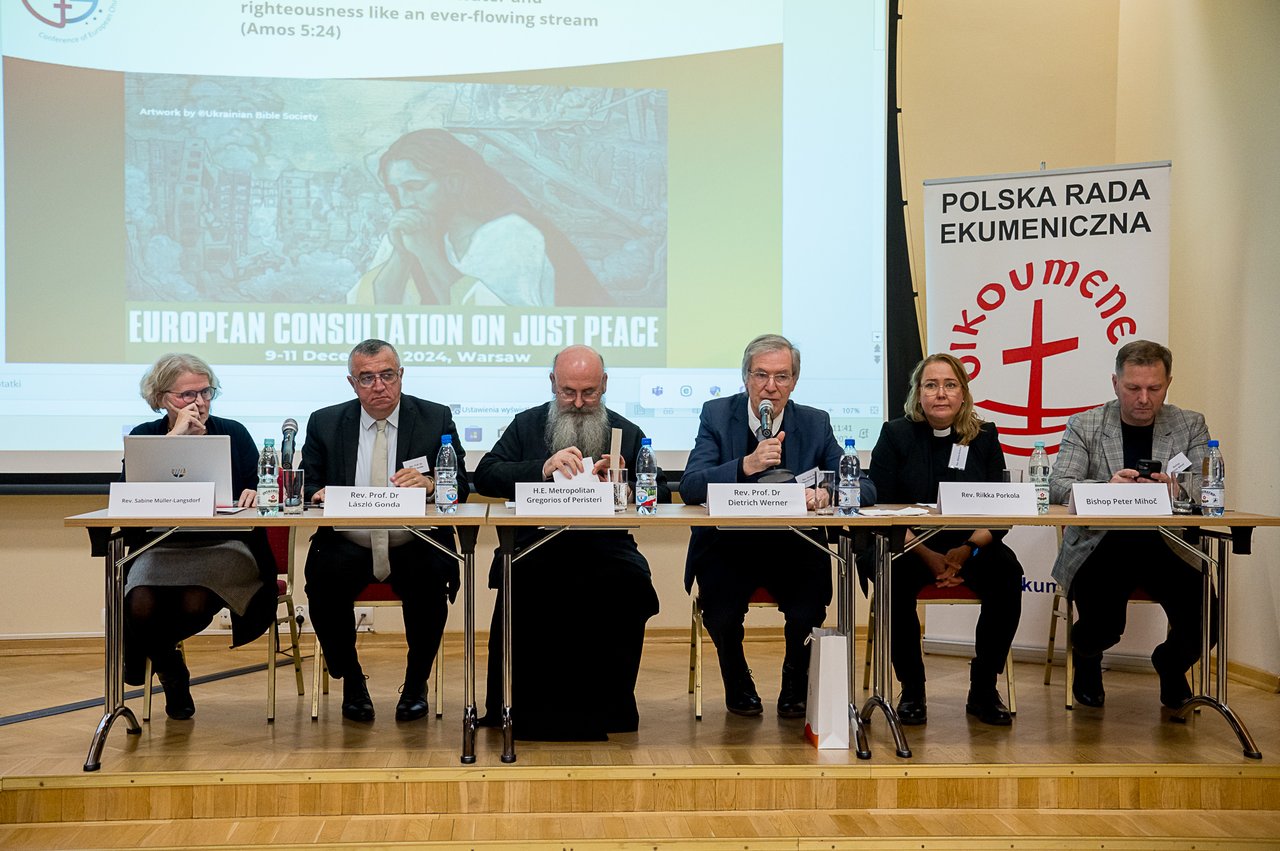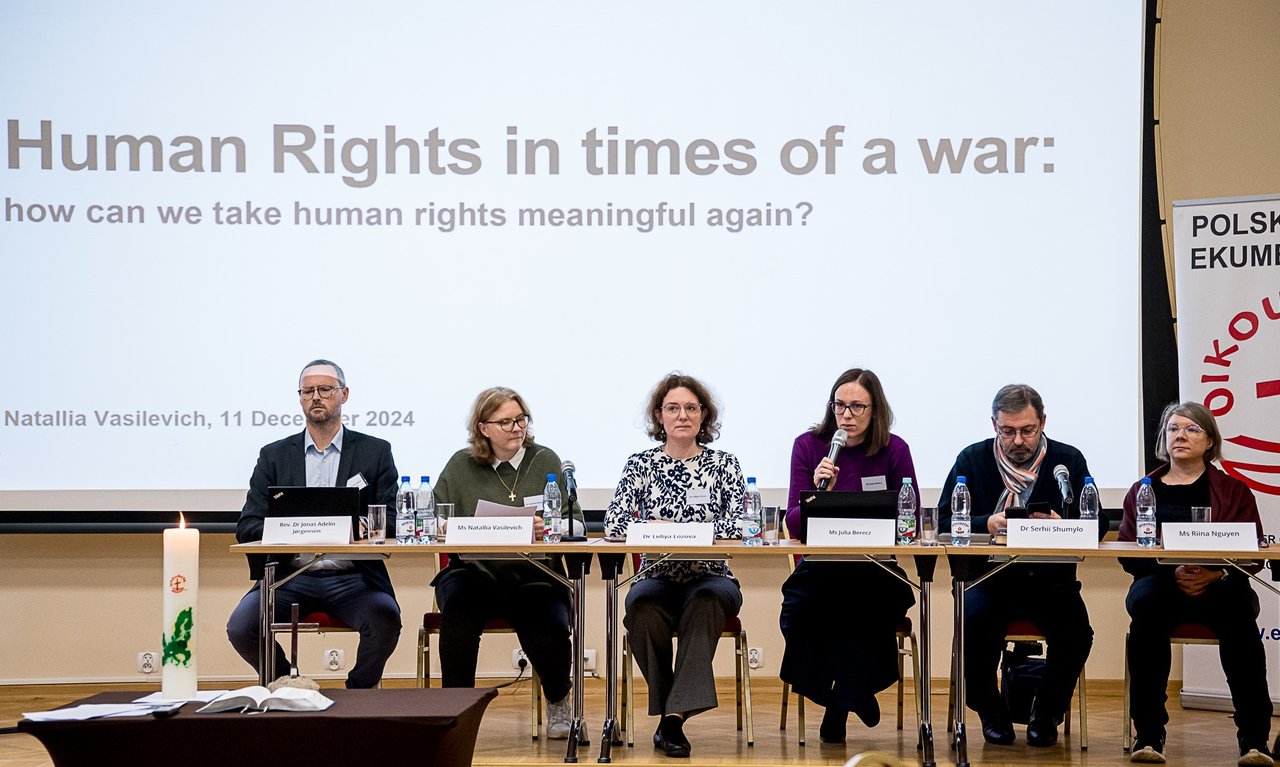In the context of the concept of just peace, which has been taking shape in the international ecumenical discourse for almost 100 years, the Conference of European Churches held a European consultation in Warsaw from the 9th to the 11th of December. The consultation included discussions on the dilemmas raised by the war in Ukraine and the opportunities and tasks of the churches in Europe and Ukraine.

Photo: CEC/Łukasz Troc
Following Russia's full-scale invasion of Ukraine on the 24th of February 2022, the war in Ukraine has become one of the key issues and tasks for the Conference of European Churches (CEC). CEC’s activity is guided by the threefold objectives set out in the Pathways to Peace (P2P) initiative: to develop a network of ecclesial and academic experts with a good understanding of the situation in Ukraine to work and prepare for peace; to act to protect damaged religious sites in Ukraine; and to contribute to the international ecumenical dialogue on just peace. The conference, which took place in Warsaw, Poland from 9-11 December, with the participation of over 80 representatives of numerous Christian denominations from Europe and Ukraine, as well as other European and global ecumenical organisations (e.g. the World Council of Churches), sought to address the dilemmas, questions and challenges of just peace.
Many have addressed the war in Ukraine in various ways, but most of the reflections do not go beyond the role of the outside observer. Therefore, one of the aims of the Pathways to Peace initiative is to make the voices of those who are primarily and directly affected by the war and its consequences heard. This emphasis was reflected in the participation of a number of guests from Ukraine, who featured prominently in both plenary and small group discussions. In addition to several representatives of the Orthodox Church of Ukraine, representatives of other Ukrainian Christian denominations (including Greek Catholics, Baptists, Reformed and Lutherans) were present. They shared their thoughts on the situation of the churches in Ukraine, on just peace, and on how they see churches outside Ukraine helping their brothers and sisters in the reality of war. The Hungarian Reformed community in Transcarpathia, which lives a double (denominational and national) minority reality, was represented by Bishop Sándor Zán-Fábián, who spoke at a panel discussion with fellow church leaders from Ukraine. Here, Bishop Zán-Fábian discussed the importance of the humanitarian aid they have already experienced, and what he considers as key to the survival of the remaining population of the country. He also shared his thoughts and dilemmas on the right to self-defence.

Photo: CEC/Łukasz Troc
The reality of the devastation of war permeated the consultation as a whole, but especially the speeches of the Ukrainian participants. While we are perhaps even more inclined to give simplistic and quick answers to the questions of the war in Ukraine as time goes on and the war drags on, it is crucial to remind ourselves again and again, both across Europe and in Hungary, that the situation in Ukraine is much more complex than we might first think. As Christians, we have a fundamental responsibility to seriously consider the pain of the people of Ukraine, who live amongst the trauma of war and suffer its direct and indirect effects, and not to trivialise the suffering they have been exposed to. In particular, it is important to understand that the war is not only an armed conflict between two neighbouring countries that are closely linked historically, economically and culturally but also has an underlying religious dimension. On the two sides of the front line, we often find soldiers and civilians of the same denomination: primarily Orthodox, but also of other Christian communities.
Perhaps also because of the specific role of Christianity and the same denominational background of the opposing parties in the war in Ukraine, one of the defining outcomes (and repeatedly rearticulated in various forms) of the Warsaw event was the recognition that churches always operate within a given social and political reality whose influence they cannot escape. For this very reason, it must be one of the defining opportunities and responsibilities of the international ecumenical movement that churches should be ready to remind one another of the primacy of their Christian identity in Christ and, where appropriate, without denying the specificities of their different national, social and political contexts, to identify the aspects and situations where the Gospel entrusted to them is harmed or compromised by the effects of their own context.
Whether a given church operates in a secular or a more religious society, it must not allow all or part of the Gospel to be appropriated by a political force for its own ends. The example of the Russian Orthodox Church, which supports Russian aggression and considers itself a brother against a people and a "defender of Christian values,” should serve as a warning to all of us: we must not allow the Gospel entrusted to us to become a prisoner of political or power ambitions because in this way we become traitors to the Gospel. However, questions are also being raised about the Ukrainian state. One of the tasks of the European churches, which stand with the brothers and sisters in Ukraine, is, therefore, to call on the Ukrainian legislature to settle as soon as possible the situation of those conscripts who, on the grounds of the freedom of conscience, request exemption from military service (the legal framework for conscientious objectors is currently not regulated in Ukraine), in accordance with international human rights principles.

Photo: CEC/Łukasz Troc
However, church resistance to state and political regimes contrary to the teaching of the Gospel is not merely a communal act. As László Gonda, Vice Rector of the Reformed Theological University in Debrecen and Ecumenical Officer of the Transtibiscan Church District of the RCH, pointed out in his contribution, based on the events of 1989 in Temesvár, which began with the involvement of László Tőkés, later elected as Bishop of the Reformed Church in Romania, and the history of the Declaration of Faith, which was drafted in 1955 under the leadership of Géza Németh, minister of RCH, individual involvement is always an essential part of the larger community story. This was reinforced by the contributions of the panel on peace and human rights, whose message was clear: we must not forget those church-affiliated co-workers, often ordained ministers in Ukraine, Russia or Belarus, who are ready to take action against state regimes that challenge the integrity of the Gospel and frequently violate fundamental human rights, even in the face of serious threats to their personal freedom.
While the participants in the consultation clearly condemned the Russian Orthodox Church's theologically based involvement in the war in Ukraine, in the regrettable absence of representatives of the Russian side, which stayed away from the consultation, just like the Ukrainian Orthodox Church (Moscow Patriarchate), the painful issue was raised again and again in a frank and honest manner as of what has led to the situation, what is the reason why Russian Orthodoxy has become a servant of Russian power; essentially unilaterally excluding itself from the international ecumenical community. Perhaps this is why the speeches of the Ukrainian and Belarusian participants, who, despite the hopelessness of the current situation, expressed their hope for the recovery and conversion of their Orthodox brothers and sisters in Russia, and also presented the grassroots initiative of the Sophia Brotherhood to build dialogue and communion between the two Ukrainian Orthodox communities, were particularly important.

Photo: CEC/Łukasz Troc
As followers of Christ, we are called to be ambassadors of peace and to remember that all armed conflict and war represent a failure. While peace has become an often carelessly used term in Eastern European societies, even more so in the wake of their socialist-communist legacy, it is important to remind ourselves of the true meaning of peace and that it is only possible in and through Jesus Christ. But this does not and cannot mean abandoning the pursuit of peace, nor should we forget that we are called to love not only our neighbours but also our enemies. We must also be clear that genuine reconciliation requires speaking truth to the power (including acknowledging the suffering of the victims), admitting wrongdoing, forgiveness and reparation for the damage done. Restoring damaged relationships requires truth, justice, mercy and reconciliation. Reconciliation ministry in Rwanda or Ukraine may have different emphases. Still, we cannot highlight one aspect to the detriment of the other because, in doing so, our efforts for genuine peace will not be successful.
Looking back over the past 3 years or the last 100 years of European history, it is essential to publicly address and educate for real peace involving the younger generations in Ukraine and beyond. The Warsaw Consultation, organised by CEC, was a first step in this direction, in the clear knowledge that, although the solution to the crisis in Ukraine is far beyond the means of our churches, as Christians, we cannot give up our hope, rooted in redemption and expressed in prayer even for the enemy, which also inspires clear action.